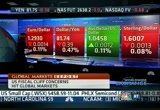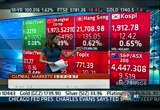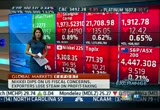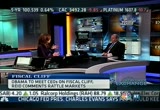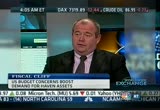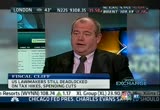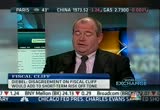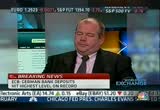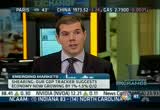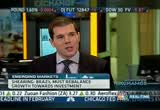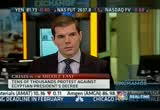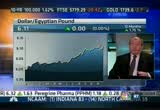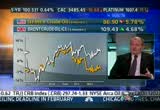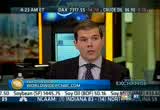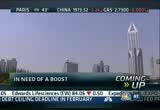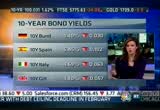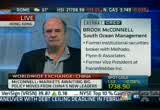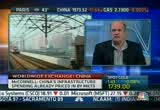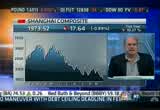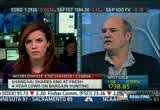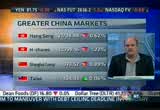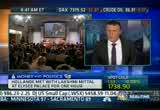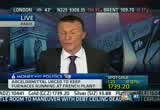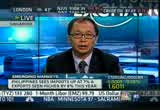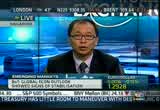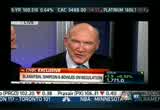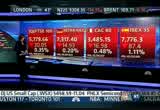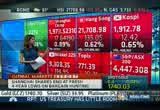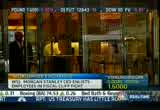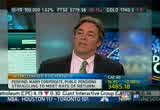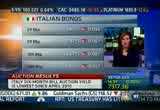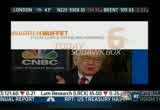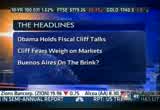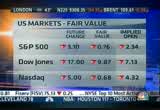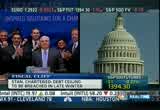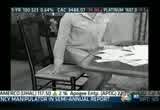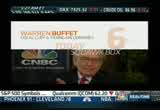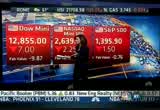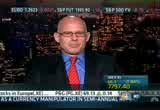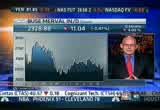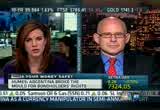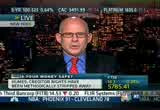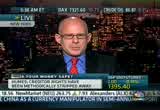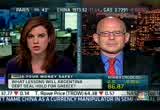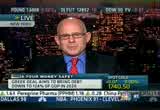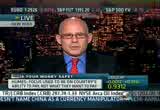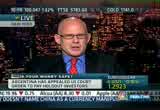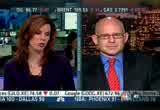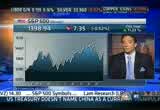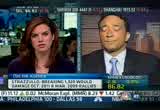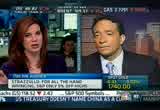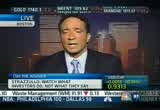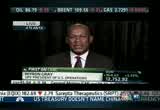tv Worldwide Exchange CNBC November 28, 2012 4:00am-6:00am EST
4:00 am
welcome to "worldwide exchange." i'm kelly evans. these are your headlines from around the world. european markets follow shanghai into the red. president obama holds a second ceo summit today at the white house, getting input from top business leaders on how the administration and congress can solve the crisis over, yes, the fiscal cliff. and origin tina's rating is slashed over five notches. we'll speak to a bondholder who once represented the country's creditors.
4:01 am
>> you're watching "worldwide exchange," bringing you business news from around the globe. as we get into the trading session here in europe, you can see behind me decliners outpacing advancers by about a 4-1 ratio, with stocks shedding about a third of a percent. we'll get to more of that shortly. first take a look at the forces individually to get a sense of where we're seeing the selling pressure and it is pretty much consistent. there's the ibex 35 down .7 of a percent. the ftse down about a third of a percent. not many green spots to find. yesterday we saw that rally in peripheral debt. today we're actually seeing firmer prices across the board, so whether the u.s. down there or italy and spain here in the periphery, 4.7%, 6%, remarkable there, level for spain even today as the country's banks are
4:02 am
being more fully examined in light of the national examination plans. the dollar/yen pulling back about half a percent to 8167. let's get to deirdre bolton from singapore. hi, deirdre. >> hi, kelly, how are you? and it's morris, by the way. but i'm flattered that you call me bolton. in china and hong kong, it was all about, what else, the fiscal cliff. those comments from the senate majority leader harry reid overnight really sparked some jitters in this session today, so we have red across the board. the shanghai composite, it is well and truly below that 2011 level, shedding another .9 of a percent. the hang seng was feeling some
4:03 am
of that pressure from chinese stocks and shedding .6 of a percent. it was the mainland banks that were the culprit. they didn't fare as badly if the mainland. some capital requirement rules are going to be implemented that are raising concerns about loans and the ability of these major banks to give out loans the remainder of year. we have the kospi in south korea down .7 of 1%. we had a north korean launch site showing increased activity. that just increased the jitters in this market. the japanese markets, they have really been on a rally, on a roll, on a tear over the last few weeks. the nikkei 225 has gained more than 9% just the last two weeks alone. the yen had something to do with this. it did strengthen a little bit against the dollar, and it continues to do so, down about half a percent as you just
4:04 am
mentioned. so all in all, kelly, from investors over here in asia like their counterparts in the u.s. and where you are in europe, lots of jitters about that fiscal cliff. >> jitters that prompted me to call you deirdre instead of morris. we'll be back to check in more on asian trade. in the meantime, president obama will continue his pr offensive. but congress remains at odds to avoid a budget deal to avoid the fiscal cliff. markets were spooked yesterday when harry reid said little progress has been made. the president today speaks at about 11:30 eastern on how potential tax hikes will hurt the middle class. obama will meet with the second group of ceos at 4:45 p.m. to get their input on how to solve the crisis. the group will include brian roberts, and yahoo!'s marisa meyer. for more, we're joined now by charles deebel.
4:05 am
the president meeting today over the fiscal cliff. really the reason for the underperformance we've seen, not just in u.s. equities, but actually worldwide overnight. >> i think so, i think there's really a reevaluation with respect to europe going on as well, and having had a greek solution. and then they start to look at the rest of the eurozone, particularly spain. so you deal with one issue, but there are still plenty more stacked up behind. so that didn't help. but yeah, those comments clearly not constructive. it is the number one problem now having got to greece effectively out of the way, spain is on the back burner. the u.s. fiscal cliff is the worry at the moment. >> for all the time we've already spent talk about it, the reaction seems to reflect the fact that an assumption that they will reach a deal is priced in and the fact that they might not is not. that's significant. >> i think that's absolutely right. people are assuming that a deal
4:06 am
will get done. no one's really thinking that we're going to get this full 3.5%, 4% gdp hit smack into the economy on january 1st. the problem is that time is marching on. we've had the election, we've had thanksgiving. the excuses are running out. the lame-duck session is only so long. that's probably why the markets are getting nervous. although you may get a deal done in q-1 rather than in q-4, the fact that it actually hits from january 1st is going to keep business very cautious, very defensive and that's going to worry the equity market. >> it's interesting because it also comes against the landscape where we've seen chinese equities underperform, they reminded us very few of its member countries have great growth prospects going forward. that's probably wise. people are saying why is it that across the globe the u.s. fiscal cliff is such an issue.
4:07 am
well, it's because sources of growth at this point are few and far between. >> that is the problem. where is growth going to come from. the one place that looked set for a reasonable 2013 was the u.s. economy. europe flat, china slower probably than this year. but a reasonable set of growth. if you put a 3.5%, 4% of gdp drag on that economy which was only growing at 2, 2.5, you're talking about throwing it into recession. that's why markets are taking heart this morning and equities remain nervous. >> the rhetoric, to avoid the fiscal cliff, taxes go up, dividend tax rates, personal tax rates, corporate tax rates go up, that that itself will cause economic weakness. what do you say to that? how are we supposed to balance
4:08 am
the risks of doing things to avoid the fiscal cliff that may also hurt growth? >> one way or the other, there is a problem. if you kick the fiscal cliff down the road, then, you know, you're talking about the u.s. running deficits close to 4% to 5% over the next decade and that's cbo forecasts. if that occurs, you're talk about the debt getting more and more out of control. because the u.s. is the global reserve council, it's reliant on global reserve investment. >> just want to make sure that people have enough treasuries to trade. that's all it's about, charles. isn't that very generous? >> it is very generous. but left unaddressed, the fiscal problem is beginning to be a problem. but equally they don't want the full hit at this stage. so it is a matter of coming to some compromise, so you are
4:09 am
going to have to see some kind of adjustment on the taxation side. that is what everyone is hopeful for. but it's still a political game. >> and we've been burned before. let's recap in the meantime a couple of developments in europe overnight. the european commission is expected to approve the restructuring plans of spags's na -- spain's national lenders today. a token price of -- yes -- one euro. the valencia-based lank was one of four to be nationalized in the past 12 months. and hundreds of greek workers marched through athens yesterday to protest layoffs in exchange for further bailout funds. the greek prime minister welcomed the agreement, which will release 44 billion euros and provide billions in additional debt relief to help the country stabilize its ailing economy. in light of this, we've gotten the agreement with regards to greece. you mentioned there's already --
4:10 am
the relief rally didn't quite last that long. is it the greece issue as we look at the performance of greek banks the way they might be affected by these restructuring plans? or is it what's happening in spain today that deserves attention? >> you have to a degree fixed the greece situation, even though you are supposedly putting the greek economy on target for a 110% debt to gdp ratio, which was the original target and that's the sustainable measure that they think. one, you have the execution problems. two, are they going to stick to target. three, again, it comes back to what you were just saying about growth. most of the assumptions that the greek plan is based on is that they will grow their way out of trouble and that doesn't look terribly likely at this point in time. >> what's the best case scenario. how is it that we can possibly
4:11 am
look forward to a situation where greece can grow its way out? >> if you get low enough interest rates and start to get eu infrastructure spending, you get some confidence back in the greek economy. part of the whole problem has been that as soon as the country comes under the spotlight, you get this massive flight out of the country. it really is confidence that they're going to remain within and are going to be successful that will bring about part of the solution. but greece always was a sort of particularly special case as the europeans love to call it. the real problem is spain, because they have a borrowing cost that arguably cost spain money to support greece as part of this bailout program because it cost spain more to borrow than they're lending money to greece, which as you say is very ironic. we're now waiting for the next piece of the puzzle to unfold,
4:12 am
which is when will spain ask for support by the omt and the esn. from a political point of view, it looks more likely in the new year, particularly because we have this huge wall of issuance. >> 200 billion euros next year. >> exactly. very large borrowing next year. and at the moment, we've seen the stabilization in bond yields because of the belief that they will be there to support it in due course. but the market's act to absorb all of that is only going to be limited, you know, and for so long. so sooner or later, i think spain will have to ask. >> charles will stay with us for a little bit more. in the meantime, coming up on the show, we're going to cross over to hong kong to assess what role retail investors could be playing in the gyrations on the shanghai composite. and phil lebeau will join us
4:13 am
4:16 am
brazil's central bank is set to make its latest interest rate decision today. the bank is widely expected to call time on a yearlong easing cycle that has seen interest rates fall to a record low of 7.25%. neil sheering of capital economics joins us now. 7.25%, still pretty high by developed world performance. do they not have more room to cut? >> well, you'd think so, wouldn't you? the reality is the bank now is facing two conflicting forces, i think. growth on the one hand seems to be picking up. before they started cutting interest rates over a year ago, and they cult interest rates by over 5.25% now. that seems to have cut through to some pickup in growth. that's likely to show the
4:17 am
economy group by 1% or more in the quarter. >> quarter on quarter? not annualized. so about 4%. >> exactly, yes. whether that's sustained is another thing. but the other issue they've got to bear in mind is inflation starts to pick up. primarily driven by food inflation. but inflation now is kind of running at 5.5%. still within target range, so with the economy picking up pace, inflation starting to accelerate. we see the end of this easing cycle. >> it's a dilemma of sorts for brazil. i'm just looking at your note here, there are strains in the growth model. growth is likely to remain relatively sluggish. and yet they seem to almost facing a stagflation problem here. >> in some reflects, brazil is the complete opposite of china.
4:18 am
china saves too much, consumes too little. brazil does the opposite. and what we're going to see just as china's investment growth muddles, brazil's consumption growth is likely to -- is equally unlikely to deliver the same rates of growth it has delivered over the past decade. we'll be lucky, i think, to get growth of 3%, 3.5% without deep structural reform. >> what kind of reforms are needed? is it something that needs to happen from the top down? or is it about encouraging from bottom up? >> it's mainly top-down reform. raise the domestic savings rate to rebalance government spending from things like wages and pensions and towards public sector investment and infrastructure and so on. tax reforms, clean up the business environments, a whole host of reforms that need to be
4:19 am
undertaken. i think the government is starting to make moves in this direction, which is good. but these reforms have been taking a long time to take hold. and we're not going to see an immediate difference. >> how much does brazil suffer if the fact that argentina is itself suffering so much? is there a lack of potential opportunity maybe in the export markets for some of its neighbors that is part of the issue? >> there's part of the issue. ironically, i think argentina suffers more from the fact that brazil has been basically flat lining the past 12 months and that's exacerbated problems in argentina's own growth model. brazil is not so particular an open economy. it only exports around 15% of gdp. so it's not a very open economy. and actually, a lot of these problems are more domestic than they are external. >> that's a fascinating point. i want to come back to you in a second. in egypt, tens of thousands have taken to the streets of cairo last night to protest against the decree by the egyptian
4:20 am
president mohamed morsi that grants him sweeping constitutional powers. >> reporter: hundreds of thousands of egyptians have poured into tahrir square and cities all across egypt demanding that president mohamed morsi rescind his decision that granted him sweeping powers. they say it is reminiscent of the mubarak era, sending this country back to dictatorship. for the past five days, police have clashed with protesters, firing tear gas and beating them at times. more importantly, they are demanding that egypt's new constitution is one that reflects the diversity of egypt, not the sole control of the muslim brotherhood. many of the people here are angered by what they say is the attempt by the muslim brotherhood and the president mohamed morsi to take control of the country and ram pole their agenda at the expense of secular forces like those that have gathered behind my. >> neil sheering still with us.
4:21 am
investors have gotten quite bullish on egypt. do you think the investment thesis is fundamentally changed? >> i think it's a bit of a wake-up call to the post-revolution transition in the egypt's economy is never going to be easy. the imf deal that was announced last week, should be agreed at broad level probably by the end of this year. that really averts the immediate threat of the balance payment crisis. that was a very real significant threat up until this deal was agreed. but anyone that's expecting very rapid changes i think will be disappointed. i think egypt is moving in the right direction, but it's going to be very much a case of two steps forward and one step back. it's going to be bumpy for at least the next year or so. >> i wonder, too, charles, would egypt be one of the biggest countries in the middle east, an important previous source of stability, what the latest bout of unrest spells for the investment picture broadly speaking? >> we saw that with the
4:22 am
israeli-gaza issues of late. really, all across the middle east, we still have the immediate ramifications of the arab spring, if you like, and obviously you've still got issues in syria. there's still tensions with respect to that. the area isn't going to settle down for quite a long time. that means we're going to have episodic periods where you get, for example, shots just because of tensions in that region. coming back to big global macro we were talking about earlier, that is one of the biggest threats to the global economy. we've got oil prices at fairly reasonable levels right now, but if you stop pushing all prices back above $100 a barrel in west texas towards 110 and 115, that's a serious break to a global economy that's already struggling. >> absolutely. and in the developed world argument, where do you see the markets in 2013? >> i would still be of the broad
4:23 am
expectation that emerging markets are better than developed markets at this point. all the legacies that we're still dealing with from the financial crisis. but they have a greater potential to grow. but equally, it's about global demand and if areas like the u.s. are not really growing, areas like europe are not really growing, it's always going to be harder for e.m. to do that well. but they're probably by their own metrics not going to be that strong. >> within the emerging market space, when you look at these various regions, where do you see the most opportunity into next year? >> i think it's very difficult to generalize, but if you were to generalize the cross regions, asia is probably the region that stands out some of the best growth prospects. africa too should do reasonably well, despite the fact that we'll have global headwinds building. emerging europe is where the great prospects really are the bleakest. obviously they're very much dependent on exports to the eurozone. you talk about asia's open
4:24 am
export-led economies. they are far more open, far more dependent on exports, particularly to germany, and the banking sectors there are very fragile, too. latin america would be somewhere in between. i think mexico will do very well. >> everyone loves mexico. and the u.s. starting to feel a little intimidated by it, i think, by how well our neighbor south of the border is doing. just want to mention to your point about eastern europe, last time we checked shares were down something like 5%. they're talking about weakness in eastern europe. prime example of this. >> exactly. austrian banks like hungary, the czech republic in recession the past five quarters. very difficult to see things turning around in central or eastern europe. >> better figure out the fiscal cliff. >> absolutely.
4:25 am
>> you listen to this and go oh, that's why it's so important. >> start with 101. >> thank you both very much for your time this morning. optimistic comments about china's growth from the commerce minister. chen said he expects chinese exports to improve next year, but gave no specific reasons for his projections. and the u.s. treasury says the u.n. is still undervalued but stopped short of labeling china a currency manipulator. it says china has allowed the u.n. to appreciate 20% since 2010. a new report suggests the u.s. treasury has fewer tools available to stave off a default that it did in 2011. if congress fails to increase the debt ceiling by year end. the bipartisan policy center says the u.s. will hit the $16.4 trillion limit in the last week of december with big payments due -- get this -- on new year's
4:26 am
eve. there's still time to scrounge up $2 if you're in the u.s. and go buy a power ball lottery ticket. the jackpot for tonight's drawing, which will take place at 10:59 p.m. eastern, is a record $500 million. it swelled in the past few days. earlier, the megamillions lottery hit a previous record jackpot of $656 million. the power ball is played across 42 u.s. states and the odds of winning it all are one in 175 million. now, if only that could help us solve the fiscal cliff and our debt ceiling issues, then it would really be something. e-mail us your thoughts. and if you're buying a power ball ticket, we want to know, should the dollar be invested in the stock market or in a powerball ticket? that's the question this morning. still to come on the show, shanghai equities tumble to
4:27 am
4:29 am
4:30 am
these are your headlines. european markets follow asia into the red. china's shanghai composite ends the session at a fresh four-year low. president obama holding a second ceo summit today at the white house to get input from top business leaders on how the administration and congress can solve the crisis over the fiscal cliff. and fitch slashes argentina's rating by five notches on fears over a possible default. we'll speak to a bondholder who once represented the country's creditors. first, let's check in on european markets. they are opening in the red, as you can see there. wow. a significant leg down on the ibex 35 there just since the last time we've checked in. now 1.3%, that index is shedding. the others holding up a little bit better, but still seeing losses. let's take a look at the bond space and see if a similar tone
4:31 am
is con veiled. we are seeing yields continue to fall on a bit of a rally, including in the periphery where spain is yielding 4.5% in italy. earlier, we saw the euro/dollar weaker and still is by about .2 of a percent. also keeping an eye on that dollar/yen, which is dropping by half a percent today to 81-70. so below 82. for more, let's head over to deirdre wong morris. the shanghai composite has closed in the red again, extending one of the longest bear market runs in three years. deirdre, what's happening? >> kelly, it's been a miserable three years and this year looks to be just as bad. we broke a very key technical level yesterday. we are well and truly below that in 1973, about shedding .9 of a
4:32 am
percent today. despite comment from policymakers, you just mentioned a few minutes ago from the commerce minister. it seems like nothing the government can say or do is going to lift sentiment in these markets. but however, foreign investors are increasingly becoming a little bit bullish. so have a listen to what peter schiff had to say to us earlier today. >> the chinese stock market has been weak for several years. as i said, it's a long-term story. i believe that the pendulum is swinging in the right direction in china. i believe they're moving from total government in a direction of freer markets and capitalism. >> now, those comments you just heard from peter, they really don't reflect what i'm hearing in the chinese mainland. one analyst that i talked to up in beijing says that he's just completely gone out of the market and he's just putting his money elsewhere, and we're hearing that -- i mean, the volumes are very low. we can see that investors are
4:33 am
voting with their feet. last thing i want to tell you, and this really puts it in perspective, is that your returns would have been greater had you put your money in greek or spanish stocks than you had the shanghai composite. >> that's a great point. and by the way, when it comes to talking about the shanghai weakness, how much of this reflects the composition of retail versus institutional investors? >> well, that's a good question, kelly, because in chinese mainland, there are so many retail investors. i still remember when i was in beijing and my cab driver asked me what i was doing in the stock market. so everyone, the moms and pops, the cab drivers, everybody is putting their money in the stock market because there's such a lack of investment options in the mainland and therefore you have a very volatile market. people are putting in money one day and taking it out the other. the gains and losses we see are very volatile. when sentiment is bad, it is really bad and it's not institutional investors controlling this. it's the retail investors. >> deirdre, thanks very much.
4:34 am
back with you in just a little bit. meanwhile, china's state researchers said the government is likely to be a balance between tight fiscal policy and loose monetary policy. he said beijing will have to reduce its government-led investments so it can free up banks. the pboc will have to lower interest rates to help local governments. joining us now, brook mcconnell, president of south ocean management, for more on just what's happening with the chinese equity market. hi, brook. and deirdre just mentioned that this is a retail-driven market. so is this retail-driven weakness? >> yes. exactly. a lot of bearishness. there are a lot of investors sitting on losses. they've been waiting for the new government to come in and get them out of their losses. the new government is still organizing itself and has not put out any policy right yet. so the sentiment, as was indicated, is extremely bearish, which is a positive if you're a
4:35 am
contrarian investor like we are. >> it's interesting, because we have heard from a lot of institutional investors lately that they like china. they see opportunity there as they start to look at the lag effects of monetary policy working through next year. they like what they're seeing in some of the early loan data. perhaps it's an infrastructure plan. when is this going to bear fruit, though? >> the million-dollar question. the shanghai stock market is about $2.2 trillion, u.s. dollars in market cap. the chinese gdp is about $7.5 trillion. so that's less than 30% market cap to gdp. in the u.s., it's about 113%, 115%. in the last hundred years, the u.s. has soldnormally at about 7% of gdp. if you have any type of a long term perspective, let's say at the end of the decade when china's economy is supposed to
4:36 am
surpass that of the u.s., let's give that a $20 trillion marketplace gdp, and the shanghai markets just to go up to 70% of that value, that's a 14,000 level on the shanghai market in eight years. so that's a pretty good return from where we are. where we go from here in the next month or two, i have no idea. >> but it just reminds me a little bit of gold where we've heard the case from the long-term investment thesis, but you would have consistently underperformed if you kept trying to get into that market on anything like a short-term view. why in particular is it that the leadership transition has failed to start to spur this turnaround when it comes to stock performance? >> there's been a lot of upheaval behind the scenes. a number of events that were of concern going into the re-election. now next month, december, there will be a policy meeting on economics and this will all be
4:37 am
put together in a manner that everybody has a say in it. and so i think there may very well be something coming out in the very near future. perhaps at this economic meeting next month that could spur substantial movement. there's $5 trillion in -- almost 5 trillion in household deposits in the banking system and little debt. they could maneuver a lot of things to put this market up and put a lot of capital into the market. there are a lot of tools to move it up. >> one theory that we've heard floated s actually that if china is aggressive enough when it comes to trying to lower the exchange rate in order to spur growth, that could have really significant impact on deposit outflows, on increasing capital outflows and ultimately hurt banks and maybe that's one reason the market is sniffing out this potential is underperforming. is there anything to that, do
4:38 am
you think? >> well, look at it this way. hong kong, if you look at the hong kong chinese shares that china enterprise market since september of this year, it's been substantially underperforming. september of this year when it has spiked up tremendously, that's due to foreigners coming into this market, foreign outside money coming into this market thinking that the china market is not going to hit a hard landing and that the china market maybe has bottomed and there's been a substantial inflow of money into these stocks. you don't get that in china. china's capital market is a closed market. so on one hand, it's very good that you don't have scared money running out of that market anymore. you just have the money that's there. so you can look at it on both side there i think. >> but your take on this, just to make it clear, is that we're looking basically at a historic buying opportunity for the shanghai composite? >> yes, definitely. >> all right. >> that you put 30% in now and
4:39 am
another 30, is this the bottom? i can't pick that. but yes, we're at very low prices right now. >> all right. we'll check back in with you in 2020. brook mcconnell, thanks very much for your time this morning. what do you think is going to happen with the shanghai composite in the months ahead? get e-mails worldwide@cnbc.com. we have the details live from tokyo. >> hi, kelly. the japanese government is planning to implement a low rate dollar loan program for its firm's overseas reactions, lows which have been hurt by unexpected circumstances like natural disasters or even riots in foreign countries. for starters, japanese businesses in china struggling with the lingering impact of anti-japan demonstrations will be eligible for assistance. the program will be set up by expanding a dollar lending
4:40 am
facility that taps the foreign exchange fund special account. this account manages the nation's foreign reserves. it supplies more than $120 billion to the japan bank for international corporation. currently, eligibility is limited to firms looking to acquire overseas businesses or concession rights for natural resources. the new expanded program is part of an economic stimulus package to be adopted by cabinet this friday. it could be launched as early as next month. back to you, kelly. >> thank you very much for that. now, the latest data out of france is showing the number of jobless in the country soaring to a 14-month high last month. there are now more than 3.1 million job seekers in mainland france, a 1.5% increase in october. it's also the 18th consecutive monthly increase. that data puts even more pressure on french president
4:41 am
francois hollande. he says france could engineer a temporary nationalization of steel works to prevent their closure in just three days time. well, for more on this extraordinary tale, stephane joined us now from paris. is this as intrusive as it sounds? >> they are increasing the pressure to keep these furnaces in the northeast of france. however, francois hollande did use the same words as the industry minister earlier this week. the french industry minister said he was no longer welcome in france because of years of broken promises with the government. yesterday evening when he met with the ceo of the company, francois hollande urged the company not to shut down the furnaces in the northeast of france. he raised the possibility to temporary nationalize these
4:42 am
activities, and he also asked to continue the negotiations until the deadline, which is set on december 1st, to find a potential buyer for these furnaces, which in total employees more than 600 people. in the meantime, the mayor of london couldn't miss such an opportunity to mock the french governmen government,. calling them a red call left wing movement during the french revolution in 1789. >> the french minister has been so eccentric as to call for a massive investor to depart from france. i have no hesitation or embarrassment in saying to everyone here -- [ speaking in french ] come to the business capital of the world. >> and of course, in france, this is viewed as a provocation. if you remember a few weeks ago,
4:43 am
he invited french businesses to move their business to london to avoid a 75% tax of high earnings. >> is there actually a real deterioration at all in the relationship between these two countries underneath some of the opportunistic rhetoric we're seeing? >> between france and united kingdom, you mean? >> uh-huh. >> we are best enemies. that's part of the history in france and i guess that's part of the history in the uk. that's the usual provocation. we could argue that we could do the same provocation when he says the french industry minister is excessive. well, perhaps he is an excessive person. perhaps he would have his position in the french government, but on the other side of the pond. >> all right, offering boris johnson a new role there. thank you very much this morning. moving on to italy now where a steel mill has been stormed by
4:44 am
thousands of workers after the operation was closed earlier this week. the mill was forced to stop production temporarily following arrest warrants for managers over pollution concerns. workers turned up to find the gates locked, have broken into the facility to protest the closure. in other corporate news, the showdown between hewlett-packard and autonomy is heating up. they have asked to detail accusations against him. in an open letter, lynch asked for the specifics of the accounting fraud allegations made against him and former autonomy executives, which hp said forced them to take an $8.8 billion writedown on the university. hp challenged lynch to face questions under penalty of perjury. now groupon's board is reportedly expected to meet on thursday and may discuss whether to replace ceo andrew mason.
4:45 am
reports say the move comes amid fractures between mason and two other co-founders. the board is reportedly frustrated with groupon's share performance. groupon is down -- get this -- more than 80% the year, in the u.s. yesterday adding 4% on a little bit of a pop there. megaphone has made its stock market debut in london. but shares in russia's second lowest mobile operator are trading below $20 a share, the bottom of the anticipated range. the ipo is still the biggest by a russian company since 2010. so, hope you feel fully caught up on your global news now. still to come, southeast asia's economies are coming up roses in the face of global uncertainties. what's driving them and will the momentum last? we'll find out next.
4:48 am
4:49 am
in the philippines, the governor of the central bank insists its easy policies are confident despite economic growth. it was well above expectations for growth of just 5.3%. for more on southeast asia, joining us now, economist at southeast asia at rbs. my apologies about that. i'm butchering names all morning. >> no problem at all. >> can you talk first at all about thailand in particular. investors look to this as a global demand and asian export demand. what are you seeing in the numbers? >> well, i think to put things into perspective, the fourth quarter export is going to be quite robust because of the low base effects. if you recall, we have floods in the final quarter of last year. so i think there's no surprise that we have a strong recovery, but this doesn't mean that the headwinds can be avoided as we move into next year.
4:50 am
>> during its last meeting, the bank of thailand with a surprising rate cut. this time they've opted to hold steady. is that the right view? >> absolutely. i mean, we have been calling the fact that -- actually, even before last month's rate cut, you know with the negative policy rate, it has actually been supportive of growth. and you can view this as, you know, somewhat an insurance slowing exports market, and with 25 paces last month, they are probably buying more into the momentum to be more sustainable. >> is it surprising that thailand, the philippines are holding up as well as they are given the weakness in their big neighboring economies of japan, or is it precisely because of that weakness that they're attracting capital inflows and perhaps doing a little bit better? >> well, to be honest, these two countries in the region are probably the jewel of investors
4:51 am
in 2012 and significant bid in 2013. reasons being, the government have actually stack stepped up in terms of its investment commitment. the philippines has sped up its public infrastructure, and revenue collection has gone better. if you talk about thailand, we have a massive up and coming project such as the water management, and then the seven-year plan was about 2.7 trillion. so it's very, very exciting. but as you correctly pointed out, i think the growth driver this time around will be more domestic. >> and do you expect that to continue into 2013, so if investors are looking for opportunity around the world right now, not seeing a lot of it over here, is southeast asia more attractive? >> i personally think so. firstly, because we have a more sound policy compared to a decade ago after being hit by the asian financial crisis. but this time around, if we look at the slew of macro potential
4:52 am
measures that has been in place, it is pretty much effective for now, and now they are gearing up towards relying more on domestic demand, because of what i mentioned, the headwinds in terms of weak external demand is going to hit in 2013. >> i also wonder if they're going to look at other policy options aside from using the kind of blunt instrument of interest rates in order to deep with capital inflows or to try and make sure that their economies don't overheat in that case. >> that's a good question. i mean, if you look at the domestic size of this regional market is growing. but for thailand, if i can bring the issue back, the opening of myanmar is actually a very important catalyst for investors to look at. if you look at the entry point being thailand in that matter is very crucial because it's not just in terms of human capital, but the excess point, a new market, not just as a production
4:53 am
hub, but as well as a growing consumption market as well. so it's very, very exciting that they should diversify a way to not just u.s. or europe or even china, but also to look at the regional southeast asia. >> 27% this year for the bangkok index. pretty remarkable. enrique -- i'm sorry. i seem to have a personal problem saying that. thank you very much for joining us today. he's an economist with southeast asia over at rbs. i just want to bring you this market update. the nasdaq omx is saying that due to technical disturbances, the swedish index, its swedish index will remain halted until further notice. it says troubleshooting is in progress. we'll bring you more update on that as we get it. in the u.s., charles evans says the central bank should keep rates low until u.s. unemployment hits 6.5%. speaking in toronto, evans says
4:54 am
that policy would carry minimal inflation risks. he previously said rates maybe would start to go up when unemployment hit 7%. now believes that threshold could be toob conservati could be too conservative. he says he doesn't expect the jobless rate to dip until at least 2015. new reports suggest the u.s. treasury has few er tools to stave off a default. the bipartisan policy center says the u.s. will hit the $16.4 trillion limit in the last week of december and big payments are due on new year's eve. and you've still got time to scrounge up $2 and go by a powerball lottery ticket. some lucky person or persons could have a lot more spending money after tonight as the jackpot is now up to $500 million. john yea has more.
4:55 am
>> reporter: these aren't just lottery tickets, they're dreams. >> all it takes is the $2 to win. >> reporter: as the hours count down, those $2 tickets are adding up. 42 states, plus washington, d.c. and the virgin islands, play powerball. officials expect ticket sales for the current jackpot to top $1 billion. many of those tickets are for office pools. >> we contributed our $2, so we're hoping to win. >> winning workplace pools often have happy endings, like the eight nebraska meat packing members who in 2006 shared $365 million. the previous power ball record. >> i've been retired for about four days now. >> reporter: for others, not so much. five new jersey construction workers ended up in court winning a lawsuit claiming a colleague cheated them. >> you don't expect anybody to do anything wrong, but when people are tempted with money, you know, sometimes strange things happen. >> the chances of striking it
4:56 am
rich, one in 175 million. statisticians say you're 33 times as likely to be attacked by killer bees and 50 times as likely to be struck by lightning. richard claims you increase your chances. he's written a book. his tips, buy as many tickets as you can afford and pick your own numbers, don't threat machine do it. >> it's all about what numbers, how do i pick the best numbers? what's the secret to picking the numbers? there is no secret. >> the odds may be longing but people keep hoping they'll be that one in 175 million. >> it's always a dream. always a dream. >> buy as many tickets as you can afford. i'm not sure that's the best strategy, but nevertheless, maybe a good idea to buy more than one. branch out from those anniversaries, birthdays. you can e-mail us worldwide@cnbc.com. you can respond to anything else you've heard on the program.
4:57 am
stick around, still to come, as u.s. investors seek safety from the looming fiscal cliff, find out why our next guest is pouring money into small and medium sized distressed bonds. more when we come back. can i help you? i heard you guys can ship ground for less than the ups store. that's right. i've learned the only way to get a holiday deal is to camp out. you know we've been open all night. is this a trick to get my spot? [ male announcer ] break from the holiday stress. save on groun at fedex office.
5:00 am
welcome back. president obama holds a second ceo summit today at the white house, getting input on how the administration and congress can solve the crisis over the fiscal cliff. fitch slashes argentina's rating five notches over fears on a possible default. we'll speak with the bond holder who once represented the country's creditors.
5:01 am
let's check in on how u.s. futures are doing. as you see behind me, it is large tloi the red, following the move we've seen in asia and europe overnight. the dow jones is implied to shed at the open. the nasdaq, whose swiss counterpart is being halted today on trade for technical difficult yis. a quick look here at europe, which is down about .2 of a percent this morning. the ibex is the one to watch. losses of over 1% at a level of 7,776.
5:02 am
the ftse 100 is shedding about a third of a percent this morning. look at the bond space. we're seeing prices rising across the board, whether it's in the u.s. in germany or even in spain and italy where yields now are at 4.5% on the ten-year and 4.75 respectively. dollar/yen is shedding a third of a percent. it's at 8187. so for more on the asian market trade, let's go over to deirdre wong morris who joins us from singapore. hi, deirdre. >> hey, kelly. we were just talk about the shanghai composite, so that is where i will start, hitting a fresh nearly four-year low, dipping further and further below that 2000 threshold. some foreign investors are seeing these very, very cheap valuations and saying now might be a time to get in. domestic investors, they are voting with their feet, leading the market altogether.
5:03 am
transactions have been incredibly low. there's a real sense of panic setting into this market, actually. over in hong kong, the hang sang was dragged down by the china sentiment. however, also looking at fiscal cliff and those worries are back in focus and that's what you saw across the region. so we saw the kospi down .6 of a percent as well, but also some activity in north korea. there were reports the north korean launch site were showing increased activity. the japanese markets really coming off some pretty good rallies. the nikkei 225 has gained about more than 9% over the last two weeks, but took some off of that today. that may have something to do with the dollar/yen. the yen is strengthening against the dollar. of course, we have elections coming up.
5:04 am
talking a lot about monetary easing so that has pushed the dollar down. but a pretty miserable picture today. >> thanks very much. president obama will continue his pr offensive today in his push to raise taxes on wealthy americans. congress remains at odds over a budget deal to avoid the fiscal cliff. markets were spooked yesterday when senate majority leader harry reid said little progress has been made. today the president speaks at about 11:30 eastern on how potential tax hikes will hurt the middle class. he'll then meet with a second group of ceos at quarter of 5:00 p.m. to get their input on how to solve the fiscal crisis. that group will include brian roberts, doug olberhaman and marisa meyer. james gorman has been enlisting the help of his employees in the fight over the fiscal cliff. "the wall street journal" reports that he asked the bank's more than 16,000 financial advisers to urge their congressmen to reach a bipartisan compromise on a budget deal.
5:05 am
gorman says no issue is more critical right now for the u.s. economy, the global financial markets and the financial well-being of our clients. jeff, hi. >> hi. >> pretty extraordinary that james gorman is putting this memo out to his employees, but the fiscal cliff appears to be the issue the global markets are most concerned about. how does it affect your own investments? >> we invest in stressed u.s. corporate bonds, mostly junk bonds. the thing that we're seeing is a lot of people are sitting on the sidelines, sitting in cash, and this represents a good buying opportunity we think for some select issues in the u.s. high yield market. >> the high yield market had gotten so rich this year. if you had said to people back in january this asset class was going to return something in the range of 20% at least through about a month or so ago, i don't think they would have believed you. and yet that's what we've seen, and we've since seen a deterioration in the market. is that related to concerns about the fiscal cliff? >> yeah, we've seen a bit of a
5:06 am
selloff. most liquid jump bonds are up about 12%. now they've gotten to a point where the average dollar price is about 11.4 and the yield is about 7%. going forward, maybe the return in 2013 is between 6% and 8% in total return. we are seeing some opportunities in this last month or so. >> what in particular? >> well, what's interesting is the biggest, most liquid jump bonds are trading at too high of a dollar price because that's where all the investors are staying because they want liquidity. the real value we're seeing is in some of the smaller high yield bonds, still $500 million issues. >> can you give some examples? >> some of the bonds like clear channel or harrah's. these are still multi-billion-dollar issues that
5:07 am
yield 8% to 9% and we think are relatively good investments. >> why is it you don't worry more about the financials when we start to look into next year? >> that's a good question. the real thing that's been happening the last few years is companies and managements are aware of the fiscal cliff. they're aware of the concerns, and companies have been very aggressively deleveraging their balance sheet. the vast majority of these bonds, they're issuing a ten-year bond, taking the money and paying off the next two, three, four years worth of maturities and they're deleveraging. >> to some extent, a version of extend and pretend. >> yes and no. for companies that are in decent shape, they are lowering their interest costs. i mean, these companies can issue a junk bond at 7%, so they're saving interest expense and they are pushing out their maturity. so they're derisking and we think this is setting us up for a couple years of low default
5:08 am
rates. >> it suggests they may even be able to borrow at rates that are lower than that 7% level, which is itself is historically low. >> yes. this is the all-time lowest yield in the high yield market. however, if you look at high yield as a spread over treasuries, which is how a lot of bond people look at relative value, the spread is still historically wide. so, you know, high yield probably has had a nice run, but probably still represents decent value. >> still room to run. we'll talk in a second about how retail investors might be able to access or what impact they're having on the market. just want to bring the results from the latest auction of italian debt. italy has sold $7.5 billion euros worth of six-month yields, an average of 0.9%. that compares to 1.35% on october 29. it is largest ever yield since april 2010. so italy's borrowing costs do continue to come down. we can see rallies in the price, a yield following to 4.67% for
5:09 am
its ten-year, and we'll watch the longer space on that as well. now a quick look on what's on the agenda in the u.s. october new home sales are out at 10:00 a.m. eastern. they're expected to drop 1% to an annualized rate of 385,000 units. at 2:00 p.m., the fed's latest beige book report. the cleveland fed and fed governor will speak today. we'll get results from american eagle, joseph a. bank, lz boy, and tivo. the l.a. auto show, a car that doubles as a wi-fi hot spot. we'll ask phil lebeau. stay tune for that. having you ship my gifts couldn't be easier. well, having a ton of locations doesn't hurt. and a santa to boot! [ chuckles ] right, baby. oh, sir. that is a customer. oh...sorry about that.
5:12 am
you're watching "worldwide exchange." >> welcome back to the program. some developments across the eurozone at the moment. first of all, ecb is in a report talking about how a reduction is technically feasible. he reiterates the monetary policy is currently very accommodative. but says the ecb will do
5:13 am
whatever it takes to calm this policy. looming layoffs mandated by the country's international lenders in exchange for further bailout funds. the greek prime minister welcomed the agreement, which will release 44 billion euros in critical loans and provide billions in additional debt relief to help the country stabilize its ailing economy. let's speak now with the ceo of phoenix investment about how these developments in europe are affecting the attractiveness of credit and debt in the u.s. >> sure. what we're seeing around the world from our clients is there is a very big search for yield right now. i mean, the big thing is we're out of the u.s. there's over $2 trillion of money in the u.s. money market funds yielding zero. short rates around the world are very low right now. most people need to generate a return of anywhere between 5% to 8%. they just can't get it in big liquid, very high quality bonds right now. and as we look around the world, whether it be italian five or ten-year bonds, spanish five or ten-year bonds and you compare
5:14 am
that with u.s. high yield bonds, u.s. high yield bonds yield more and right now the companies in the u.s. have really delevered a lot of their balance sheets. >> you're saying which is the craziest investment at this point, the rich names or spain at 4% or 5%. >> exactly right. even if you go to the shorter end, when you take less duration, yields are very slow. >> what's interesting too is to look at who's buying. so you mentioned, for example, pension funlds, whids, which ar becoming an increasingly structural source of investor appetite here. do you expect that to be one reason why the rally continues and is there any reason we should be worried about the exposure that will accumulate on these funds? >> no, i do think this is going to continue. i think pension fund endowments are going to continue to look at credit. that's been a popular trade last
5:15 am
year. i think it's going to continue this year. and as long as the fed keeps short rates low until 2015, is what they've said, there is going to be short-term volatility like there always is. but as long as short rates stay low around the globe and in the u.s., i think there really aren't many places you can get 6% to 7% type yields. >> it's one reason retail investors have been looking, but etfs largely being the way they can access it. what impact is that etf demand having on the market? >> it's the retail flow really is deriving the technicals now. wall street has pulled back dramatically. the retail etfs have gotten record inflows this year, but every once if a while when there's fear in the market, there will be a large outflow and the price will drop. >> we know it's the dumb money. if that's what's pouring in right now, isn't that a reason to be cautious? >> i don't think so. i do think retail, which has put a lot of money into credit, has
5:16 am
done very well this year. especially, you know, junk bonds are up about 11%. money markets are at zero. so it's been good. good trade so far. i think as long as the fed keeps rates low until 2015, this is going to be a better total return story than the real short end of most bond markets. >> all right. it's fascinating. thank you so much for your time. >> thank you. >> the european commission has approved the restructuring plan of spain's nationalized lenders today. it follows a deal struck by the spanish government. the valencia based bank was one of the four to be nationalized in the past 12 months. if you're just tuning in to "worldwide exchange," these are your headlines. u.s. ceos heading to washington give obama some advice on avoiding the fiscal cliff. european equities in the red as fears over the edge of the cliff loom larger. and concerns about a default in argentina as fitch slashes the country's sovereign rating by five notches.
5:17 am
ahead on the show, the powerball lottery hits a record half a billion dollars. just what are the actual chance of winning? stay tuned to find out. [ male announcer ] this december, remember -- what starts with adding a friend... ♪ ♪ ...could end with adding a close friend. ♪ the lexus december to remember sales event is on, offering some of our best values of the year. s is the pursuit of perfection.
5:20 am
welcome back to the program. u.s. futures were poised to open a few points lower and that is still the case. dow looking to shed a few points. this follows a loss of larger magnitude yesterday. it comes as president obama will continue to push. eamonn has more on the fight from capitol hill. >> if there was any question that the market is hanging on every word of this fiscal cliff debate here in washington, it was answered yesterday when senator harry reid came out before cameras and said that he was upset that there had been "little progress in the negotiations on the fiscal cliff." the indexes really took a dive. let me play you a bit of what harry reid had to say. >> there's been little progress with the republicans, which is a disappointment to me. they've talked some happy talk
5:21 am
about doing revenues, but we only have a couple weeks to get something done. so we have to get away from the happy talk and start talking about specific things. >> so the important thing there is what harry reid actually said, which is he said that he doesn't think there's been enough progress from republicans. what he's meaning when he says that is that he doesn't think that they've conceded enough. so what the market took yesterday is a symbol that it was really evidence that the negotiations are ongoing. harry reid, the democrat, is asking for more concessions from the republicans, and in turn, republicans came out to those same cameras and expressed some criticism of the democrats. that's part of the normal sausage making process here in washington. nothing necessarily to get alarmed at and not an indicator that this deal is somehow wildly off track. it is an indicator that people are negotiating in washington and we already knew that. but let's watch what happens today. it could be another eventful day here in washington. back to you. >> eamon javers with that report
5:22 am
from washington. joining us now, david simmons. welcome. are you confident they'll reach a deal? are you concerned about these comments from harry reid? >> i think you'll always get this sort of posturing. one of the things the republicans are waking up to is the vast majority of what's going to happen at the end of this year will affect what they want. when you look at it, it's 2/3 tax increases, 1/3 spending cuts. half of those spending cuts are going to come on the defense side. so you've only got 1/6 upsetting the democrats and 5/6 upsetting the republicans. the democrats are in a stronger porks i think it position. >> given the market reaction we saw yesterday is whether investors need to recalibrate their reaction that this will be resolved. if it's not, we know there will be economic fallout. but as it becomes more and more in the headlines, is there real risk that despite the improvement we've seen in consumer confidence, 9/11
5:23 am
busine -- even in business spending, that progress will be made. >> we think we're going to get a resolution. the fallout would be too great for either political party not to see a resolution of this. and ultimately, we have to see this. the parties have already been told they're not going to be going on holiday until there's a resolution. obviously the year end for them, the fiscal cliff will hit and they'll get the new congress coming in. >> there's the debt ceiling, too, so there's real need to strike a deal that will avoid having to deal with this issue again as that looms. the gop line on this is that look, we don't want tax rates to go up because that will hurt growth. does the composition matter from a topdown macro point of view, or is there more a risk that if this isn't resolved, that that hit to gdp growth materializes? >> i think it does matter. if you raise taxes on people at the lower end, it is going to affect their spending. people at the higher end, it's
5:24 am
going to see them cut their savings rate. that's really why president obama wants to separate out between the people who make more than 250,000 and the people who make less. the republicans have said they're not going to separate the issue. that's really something he was hoping to do because he was wanting to extend the tax cuts for people who made less than that and the republicans have said no. so ultimately, it's just become a situation of whether you extend the tax cuts for everyone or extend them for no one. what we're looking for is to see the tax hikes coming in the next four years rather than hit all in one go at the end of the year. definitely for the u.s., you would see a very dire first half of next year. but it would solve all of the deficit problems. it would solve the fiscal issues. so it would be taking your medicine and having to grin and bear it. >> this is the real tension, because a deal that avoids the fiscal cliff is a deal that also means avoiding a major change in the deficit situation right away. >> you do need to see some sort of structural plan to address
5:25 am
the deficit problem going forward, and ultimately, the ratings agencies are looking for a long-term plan. they're not looking for a quick fix overnight. they want a plan in place at the end of this year. most of the agencies have said if the fiscal cliff twowas to h it wouldn't actually affect the u.s. rating because it would bring the deficit down rather than up. >> how is your view shaping up for the u.s. economy? if this can be resolved somehow, does it remove the major source of uncertainty? >> well, you're going to have a drag coming from government spending straight away. and you're going to have people having less money because you are going to see an increase in tax rates, but it's going to be much more modest than if you have the whole fiscal cliff hitting. we're looking for a relatively slow start to the year. once people get their feelers out, we look for spending to increase for the year. you start weakly because it's a step down because of the increase in tax rates that you're seeing. but the year should get better going forward. >> we'll leave on that hopeful
5:26 am
note then. david simmons, thanks very much for stopping by this morning. now from the u.s. issues to europe's, we just want to bring you this news. the european union has approved the restructuring plans of spanish banks. the plan will cost a total of 37 billion euros. bondholders will also carry some of the costs. and on that note, still to come, argentina's battle with sovereign bondholders could put buenos aries on the brink of default. that's when we come back.
5:29 am
welcome back to "worldwide exchange." if you're just tuning in, i'm kelly evans and these your headlines. president obama holds a second ceo summit today at the white house, getting input from top business leaders on how the administration and congress can solve the fiscal cliff. european markets following asia into the red. china shanghai composite ends the session at a fresh four-year low. details of spain's bank restructuring plan are unveiled. the program will cost a total of $37 billion euros. >> you're watching "worldwide exchange," bringing you business news from around the globe. the news on spain's bank
5:30 am
restructuring plan may be helping to lift markets just a little bit, we are seeing the dow jones poised to actually open higher by a couple of points, taking for a value into account. the nasdaq and s&p 500 are flirting with that flat line. take a look at what's been happening overnight. the ftse global 300 gives you a sense -- we are largely tracking lower, but we have seen a little bit of a pop here just in the last couple minutes. european still in the red, but we are coming off the lows of the session. ftse 100 down about a quarter of a percent. over here, the ibex 35 in spain, which we saw chilling losses of about more than 1.3% is now down about .8 of a percent. thanks for joining us. here's a quick look at what else you've been hearing from some of the experts on our program this morning. >> looking somewhat rich. also cautious on finland where
5:31 am
we think there could be some problem next year also regarding rating. >> the sterling i think represents the best and i would avoid the euro like the plague. >> depend on big financial leverage to make money. and those businesses were the customers that were struggling. they have been leveraged on the left-hand side. so that is a fundamentally tricky business. >> now the eu zone to approve the restructuring plans of spanish banks and he says the plan will cost a total of $37
5:32 am
billion euros. he said nationalized banks will reduce their number of branches by up to 50%. this follows a deal for a token price of one euro. he said that plan is cheaper than it would have been to liquidate the bank altogether. fitch has slashed argentina's credit rating by five notches, citing the risk of probable default. this after a u.s. court ordered buenos aries to put aside $1.3 billion. those bondholders declined to participate in two debt swaps tied to argentina's 2002 default. joining us now for the meaning of all of this, the president of graylock capital and former co-chair of the global committee of argentina bondholders. good morning. thanks for joining us. your initial reaction to the details and whether the pund lum is perhaps swinging back towards
5:33 am
bondholders.endulum is perhaps swinging back towards bondholders. >> yeah, i think that's not a bad way to describe what's going on. the quick decision was on the back of obviously years of litigation. and i think a lot of the -- a lot of what precipitated the decision that the judge made was really a result of how aggressive argentina and the council was. almost sort of repudiating the jurisdiction of the united states. i think that's sort of continuing. if you look at the overall situation, the amount that's being litigated is not that much in proportion to what argentina has, even in their reserves. so this is almost -- you know, it's really getting back to a willingness to pay what they're contractually obligated to. and, i mean, i think to some extent that's part of the
5:34 am
dynamic that shifted back when we did the first restructuring, but the discussion was a willingness, not a capacity to pay. by being pinned down and being forced to address this legal claim, i think going forward, countries are going to have to be a lot more careful not to just renege when they don't have the willingness -- you know, when it's politically convenient not to pay. so we'll see what happens in the next few weeks. but this is going to be -- this is going to establish some real precedents legally and i think will shift the dynamic of the discussions going forward in sovereign structurings. i will say that a lot of the research that you've seen that this is going to destroy the paradigm of sovereign restructurings is frankly somewhat hysterical. >> i wonder what the implications are then, especially as we look forward to greece, as we look to other european zone members. when they go through a restructuring going forward, how
5:35 am
different are the rules that they're facing, or is the entire sort of paradigm that they're facing from argentina's situation? >> that's a good question. most of the debt that is being dealt with currently has what's called a collective action clause. so if a vast majority of creditors accept the terms, there will be a -- sort of a sweep-in of the balance. in the current case in greece, about 6% of the debt was not swept in and some of that has held out of the restructuring. it's a pretty small percentage. up until now, greece has just paid what has come due. but, i mean, to give that some sort of historical context, there's always been a small percentage to tell of sovereign
5:36 am
restructuring. this isn't something that breaks the mold if 95%, 97% accept a restructuring to make the financial situation of the country viable going forward and the balance gets a disproportionate amount or at least a bigger payout. i think in terms of what this might do may not apply as much to the european countries, it's probably going to apply more to smaller countries, countries that aren't in the union and don't have quite the oversight that has gone on in the greece restructuring. greece, when they first started the process, they had -- there was quite a bit of a push almost to not recognize the committee that had been formed by the institute of international finance. and that sort of shifted the dynamics through the middle of last year, of 2011. when the committee was recognized and the negotiations
5:37 am
started, the end result was a very high participation, even before the retro active collective action clauses were nut place. in the case of argentina, there wasn't a recognition of the committee and i think that that set the conditions under which elliot and other funds were able to pursue a legal course that's created all this disruption. but it really was the action of the country from the get-go that created this dynamic and i think the final decision is going to be a lesson for other countries. >> while this may be bad news for argentina, perhaps it could be better news from the point of some of these struggling peripheral economies that want to attract more investors. we'll pick up this discussion in just a second, though. please stick around, because in the meantime, we're going to take a quick break. millions of americans are also trying their luck on the lottery tonight. the powerball jackpot is hitting a record-breaking 500 million dollars. we'll have details on that and more on a discussion about argentina's sovereign debt restructuring after the break.
5:40 am
5:41 am
situation should be concerned about what is happening here, or if in fact this may ultimately reassure investors about holding sovereign debt going forward. >> i think that countries are already paying attention to what's going on in argentina. there are a couple negotiations that have been going on currently with smaller countries, where there's been definitely a bit of a u-turn in terms of the behavior. i think what's important to point out is back in 2001, 2002, 2003, argentina really made a choice to go it alone, basically go with the unilateral offer to its creditors. when we put together the global economy, we tried to -- we put together debt sustainability analysis and tried to engage them in a discussion what they could afford to pay.
5:42 am
kirshner at that point said this is what we're going to do and that's it and they sort of tweaked some things in the margin, without actually meeting with us. i think we had one meeting in buenos aries that broke down. when they finally came to the table and put forward an offer, it ended up getting about a 75% acceptance and that was with all the controlled banks in the country, the country had bought back a lot of the debt. at 75%, they really couldn't avoid the kind of litigation that came around. and so what's happened in the last little while is a few countries that have been trying to deal with debt situations that might not be sustainable have shifted the talk about what they can pay. what might be politically expedient for them not to pay. so i think sovereign investors should actually have a little bit more confidence that when really pushed, there may be actually some ability to have resource in the courts.
5:43 am
i think in some ways it's a bit unfortunate that the kinds of funds that have been pursuing this in the courts are funds that have really just been able to use litigations as a way to get recovery and that they've bought it at a pretty steep discount. the realities is most of the funds that invest in sovereign bonds at face value don't have the capacity to pursue their claims in court, and it's left to argentina has really enjoyed calling vulture funds to find out what is legally enforceable. but, i mean, maybe this is a long way to answer it. i think the end result is people investing in the sovereign markets under u.s. law should have a little bit more confidence that they may actually be able to, you know, get countries to react. i think going forward, this has been a benefit. >> hans, do you expect argentina to make this payment by december
5:44 am
15th? >> that's -- i think what's being suggested now is that if they're going to pursue the legal avenues, that they're going to have to post a payment -- the payment of the 1.3 billion in escrow. what's interesting is guillermo nielsen, the debt negotiator for argentina back in the first go-around, the 2005 exchange, frankly i consider it to be quite a bit part of the problem in not dealing with the creditors, but even he suggested that they post the payment into escrow and let the legal process go. we've heard in argentina that the main person who is opposing sort of a rational process in seeing how this goes is the president, christina fernandez kirshner, but that there seems to be a bit more of thought that
5:45 am
they make this payment. actually, just a payment to elliot, to aurelias, i'm not sure it's going to be in the cards. i think the choices that they try to pay the restructured bondholders via an alternate payment system, that they refuse to pay anybody and go into default, pay an escrow and follow the legal process here in the united states. i think just an outright payment is unlikely and i think that a default is unlikely. so we'll see. i think right now maybe that if they don't get any kind of a decision in the second circuit, to get an additional stay, that they may actually pay into escrow. >> it's a fascinating case and certainly one that carries a lot of precedent for countries
5:46 am
across the globe. thank you very much for your time today. now you're watching "worldwide exchange." if you're just joining us, these are your headlines. u.s. ceos head to washington to give obama some advice on avoiding the fiscal cliff. european equities in the red as fears over that cliff loom larger. concern about a default in argentina. there's still time. you scratch $2 and you could have a lot more spending money tonight. the jackpot is now up to $500 million. john yang has more on the latest lotto mania. >> these aren't just lottery tickets. they're dreams. >> we're winners this time, though. >> all it takes is $2 to win. >> as the hours count down to wednesday night's drawing, those $2 tickets are adding up.
5:47 am
42 states plus washington, d.c. and the virgin islands played power ball. officials expect ticket sales for the current jackpot to top $1 billion. many of those tickets are for office pools. >> we contributed our $2, and so we're hoping to win. >> winning workplace pools often have happy endings, like the eight nebraska meat packing plant workers who in 2006 shared $365 million, the previous power ball record. >> i've been retired for about four days now. >> for others, not so much. five new jersey construction workers ended up in court winning a lawsuit claiming a colleague cheated them. >> you don't expect anybody to do anything wrong, but when people are tempted with money, you know, sometimes strange things happen. >> the chances of striking it rich, one in 175 million. statisticians say you're 33 times as likely to be attacked by killer bees and 50 times as
5:48 am
likely to be struck by lightning. richard lustig claims you can improve your chances. he says he's won millions in the florida lottery and has even written a book. his tips, buy as many tickets as you can afford and pick your own numbers. don't let the machine do it. >> it's all about what numbers, how do i pick the best numbers, what's the secret to picking the numbers. there is no secret. >> the odds may be long, but people keep hoping they'll be that one in 175 million. >> it's always a dream. always a dream. >> the key question, of course, is whether you're going to play. one of our viewers has tweeted in to say that playing the power ball is a tax on the mathematically challenged. i'm in. another disagrees. he says a dollar in apple stock eventually becomes $2 versus zero in power ball. not sure if it's conventional wisdom that a dollar in apple doubles. maybe that's a bit of a warning sign for the shares. but in any case what are you going to do with your dollar? are you going to put it in the
5:49 am
powerball? put it in the stock market? e-mail us, you can tweet us. and stick around, because coming up, the world's top auto makers rev up their engines and reveal the newest models at this week's auto show. we'll have a live report next. can i help you? i heard you guys can ship ground for less than the ups store. that's right. i've learned the only way to get a holiday deal is to camp out. you know we've been open all night. is this a trick to get my spot? [ male announcer ] break from the holiday stress. save on grounipping at fedex office.
5:51 am
welcome back. european markets are off their lows, but still generally speaking in the red during the trading session. about a quarter of a percent lower on the ftse. a third for the cac. .9 of a percent for the ibex 35 even as we're getting the detail of spain's plan. u.s. futures, they've been struggling to get in the green this morning, and we are seeing them slipping back below. dow jones implied to open lower by about three points.
5:52 am
s&p, nasdaq also pointed a couple points lower as well. for more on what we face today in the u.s. trading session, let's hear from bill, partner and chief market strategist. bill, what's it going to be? is it still fiscal cliff concerns that predominate? is anyone going to care about the new home sales report? >> yeah, i think the new home sales will be important. probably will be a touch lower than expected due to the impact to the hurricane, but i think kelly what you really want to do here, we've had a nice run lately. just kind of being disciplined, mapping out our trading ranges and sticking with those ranges. right after the election, we advised our clients we should get a good move to the downside. s&p futures around 1430. took our profit down at 1350 and turned around and advised them to get long, right at 1340 and came back to the 1400 area. and the point is that you're getting into a time of the year now where the markets start to
5:53 am
get thin. you've got a lot of headline risk with the fiscal cliff negotiations. also still coming out of europe. so you want to try to be disciplined about what you do. don't get caught in the middle. map out what you think are your good buy and sell levels and stick with them. i think in the s&p, you want to be a buyer, 1340, 1320. as you get up to the 1430 area and above, you want to reduce your equity exposure. and the dax, 7150 to 7500. in the ftse, i think you can buy right around here with the idea you get a push to the 6,000 area. if you want to widen it out a little bit, 5600 to 6,000. the nikkei, call it 9,000 to 9500. we're coming to the end of the year. markets are going to start to get thin. there's a lot of headline risk. be disciplined about what you're doing, i think you'll be fine. >> i'm impressed with your knowledge of those market ranges, but i'm curious whether you broadly think the market is going to end the year higher than where we sit now?
5:54 am
>> put it this way, i think bigger picture, if we can just stay around here -- for instance, once the dust settles after the fiscal cliff, if the market is just, you know, holding above the 1320 area, i think that's a really good sign that we've weathered the storm. i think for the people watching the show, given all the news on a day-to-day basis, it can be really confusing to try to digest it all. you want to think about what are the levels that tell you that there is some real major stress here. i look at the area around 1330, 1320, the s&p futures. if you start to break below that area, that says that you're causing some real damage. not only to the rally from last fall off the october 2011 lows, but also going all the way back to march 2009. so use that as kind of a barometer. if you're holding above 1330, 1320, i think everything's okay. >> although you don't love,
5:55 am
despite the time of year, silver and gold, which you think would do better on reflation, on a market rally. >> we advised our clients to start selling gold since mid september. caught the move and played it on the upside a little bit. i think a lot of the good news on gold with regard to the quantitative easing was really priced in. you had everybody on the same side of the boat, and i still think you've got a lot of people kaul caught going the wrong way. if i can sell 1756 to 1776 and the fed gold futures, i think you get a shot down to the 1700 area, maybe even 1620. and silver, the same thing. i like being a seller up around
5:56 am
$34 with the idea you probably got a couple bucks on the downside. >> partner and chief market strategist bell curve trading out of boston. a quick reminder of what we are seeing on the agenda in the u.s. the new home sales report is out at 10:00 a.m. eastern. we'll see if it follows the optimism we've seen in figures of late. 2:00 p.m., the fed's biggest beige report. a slew of earnings, including tivo. for all you car fans out there, the u.s. auto show kicks off this week with the l.a. auto show. nearly a million people are expected to check out some 50 new vehicle launches. electric and hybrid vehicles will be on display. california does account for 11% of all new u.s. auto sales. i wonder if there will be any driverless cars at this one next. i hope not. in any case, that's it for today's show. thank you for tuning in. i'm kelly evans. up next is u.s. "squawk box." don't go anywhere. [ male announcer ] this december, remember --
5:57 am
5:59 am
good morning, today's top stories, ceos heading to the white house to make their fiscal cliff pitch to the president. in global market news, the obama administration declines to name china a currency manipulator. and on the economic front, a report on new home sales topping today's agenda. it's wednesday, november 28th, 2012. "squawk box" begins right now. ♪ here comes santa claus here comes santa claus right down santa claus lane all his reindeers pulling on the reins ♪ >> good morning. i'm becky quick
222 Views
IN COLLECTIONS
CNBC Television Archive
Television Archive  Television Archive News Search Service
Television Archive News Search Service 
Uploaded by TV Archive on

 Live Music Archive
Live Music Archive Librivox Free Audio
Librivox Free Audio Metropolitan Museum
Metropolitan Museum Cleveland Museum of Art
Cleveland Museum of Art Internet Arcade
Internet Arcade Console Living Room
Console Living Room Books to Borrow
Books to Borrow Open Library
Open Library TV News
TV News Understanding 9/11
Understanding 9/11

